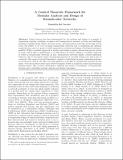A control theoretic framework for modular analysis and design of biomolecular networks
Author(s)
Del Vecchio, Domitilla
DownloadDel Vecchio_A control.pdf (402.1Kb)
PUBLISHER_CC
Publisher with Creative Commons License
Creative Commons Attribution
Terms of use
Metadata
Show full item recordAbstract
Control theory has been instrumental for the analysis and design of a number of engineering systems, including aerospace and transportation systems, robotics and intelligent machines, manufacturing chains, electrical, power, and information networks. In the past several years, the ability of de novo creating biomolecular networks and of measuring key physical quantities has come to a point in which quantitative analysis and design of biological systems is possible. While a modular approach to analyze and design complex systems has proven critical in most control theory applications, it is still subject of debate whether a modular approach is viable in biomolecular networks. In fact, biomolecular networks display context-dependent behavior, that is, the input/output dynamical properties of a module change once this is part of a network. One cause of context dependence, similar to what found in many engineering systems, is retroactivity, that is, the effect of loads applied on a module by downstream systems. In this paper, we focus on retroactivity and review techniques, based on nonlinear control and dynamical systems theory, that we have developed to quantify the extent of modularity of biomolecular systems and to establish modular analysis and design techniques.
Date issued
2013-10Department
Massachusetts Institute of Technology. Department of Mechanical Engineering; Massachusetts Institute of Technology. Laboratory for Information and Decision SystemsJournal
Annual Reviews in Control
Publisher
Elsevier
Citation
Del Vecchio, Domitilla. “A Control Theoretic Framework for Modular Analysis and Design of Biomolecular Networks.” Annual Reviews in Control 37.2 (2013): 333–345.
Version: Final published version
ISSN
1367-5788